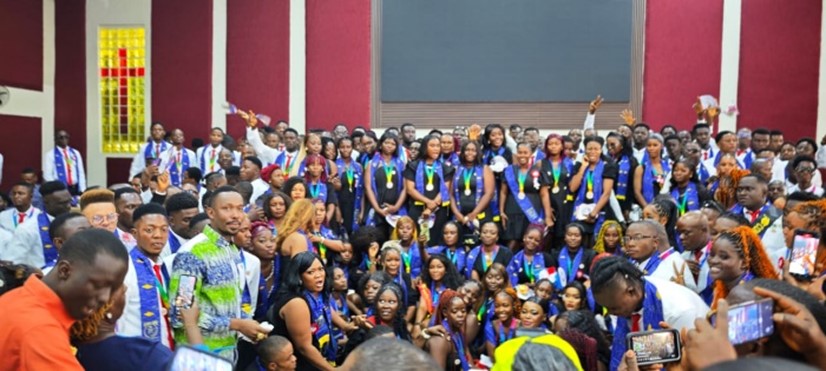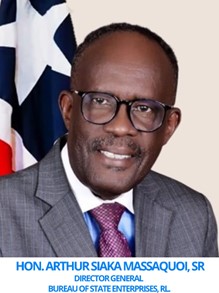The Foreign Minister, H.E. Sara Beysolow Nyanti, a well-regarded international development expert, found herself at the center of a growing storm of controversy. A former United Nations Assistant Secretary General and a respected figure in international development circles, Nyanti’s reputation was built on a two-decade-long career focused on public service.
Yet, her involvement in a multi-million dollar scholarship program called Nekotech, a Ghanaian-based organization aimed at providing educational opportunities to Liberian youth, has become the focal point of fierce criticism and allegations of fraud.
Nekotech, a seemingly ambitious program promising scholarships, work-study-abroad opportunities, and academic support, initially seemed like a godsend for Liberia’s youth, who face significant challenges in accessing quality education.
However, since its introduction to Liberia, the program has been plagued by accusations of exploitation, misrepresentation, and financial malpractice. As these allegations mount, a significant question arises: why have some critics targeted Sara Beysolow Nyanti specifically.
When Nyanti introduced Nekotech to Liberia, the program was marketed as a transformative opportunity for young Liberians, offering them access to international scholarships and educational programs. The program was purported to be a $25 million initiative that aimed to provide much-needed support to students seeking to study abroad. With a focus on education, a sector that has long been underfunded and neglected in Liberia, the promise seemed noble—an opportunity for students to gain the skills and knowledge required to succeed on the global stage.
Nekotech’s CEO, Princess Asi Ocansey, quickly became the face of the organization. While she presented herself as an advocate for educational access and international cooperation, her alleged past raised eyebrows. Allegations emerged suggesting that Ocansey had been involved in some shady deals, though the charges were never fully substantiated. Despite this murky past, she was allowed to lead Nekotech’s operations in Liberia.
The program promised students financial aid, guidance, and preparatory support to study abroad. However, it required students to pay an upfront fee of $236 for “preparatory support,” despite the program’s claim that these funds would be covered by the scholarship grants. This amount, according to Ocansey, will be refunded to those who paid.
Nyanti’s critics argue that her involvement with Nekotech, whether through naivety or complicity, has damaged her credibility and tarnished her standing within Liberia’s political establishment. While the exact motivations behind these attacks remain complex, there are several key factors that suggest why she has become a primary target.
1. Political Rivalries and Power Struggles
One of the main reasons critics are gunning for Nyanti is the fierce political rivalry within Liberia. Nyanti, an influential figure within the ruling administration of President Joseph Boakai, has risen to prominence within a highly competitive and often volatile political landscape.
As a woman of stature, with a strong international reputation, she has become a political threat to those who feel threatened by her potential. Her appointment as Foreign Minister was seen as a power play by many, particularly in a country where political positions are often used as levers for control.
As Nyanti gained more influence, there was a growing sense that some political figures, especially those within rival factions, might have seen her as an obstacle to their ambitions. In such a context, the criticisms leveled against her involvement with Nekotech could be viewed as part of a larger political campaign to weaken her. By tying her to a fraudulent program, critics can undermine her public image and weaken her political standing, making it easier for rivals to position themselves as more trustworthy alternatives.
2. The Fight for Transparency and Accountability
Liberia has long struggled with issues of corruption and mismanagement, particularly when it comes to government programs and development initiatives. In this context, accusations against Nyanti are not merely personal; they reflect the broader dissatisfaction with governance in Liberia. The allegations surrounding Nekotech feed into a growing narrative of corruption within the government. Given Nyanti’s prominence as a public figure advocating for international development and youth empowerment, her association with a questionable program has raised serious questions about her ability to govern transparently
3. The Question of Personal Accountability
As Foreign Minister, Nyanti holds a key position of power within the Liberian government. The success of Nekotech, which was introduced under her watch, reflects directly on her ability to make sound decisions regarding foreign partnerships and initiatives aimed at benefiting the country’s youth. Critics argue that she failed in her duty to thoroughly vet Nekotech before endorsing it, and in doing so, jeopardized the future of countless Liberian students.
Some critics also question Nyanti’s personal involvement in the promotion of the Nekotech program. Did she truly believe in the organization’s promise, or was she acting out of political convenience? If Nyanti was aware of the alleged fraudulent practices but chose to overlook them then she would be complicit in the exploitation of vulnerable students. The ethical implications of her involvement have fueled the fire of criticism, with opponents calling for her resignation as a matter of personal accountability.
4. Gender Dynamics and the Challenge to Liberia’s Patriarchal Norms
The scrutiny of Nyanti may also be seen through the lens of gender dynamics within Liberia’s political scene. As a woman who has risen to a prominent position in a male-dominated political environment, Nyanti represents a challenge to the traditional gender roles and power structures in the country. This dynamic could partly explain why some of her critics are particularly aggressive in their attacks.
In Liberia, where women in leadership are still a minority, the pressure on female leaders to maintain both professional and personal integrity is immense. Any perceived misstep, like Nyanti’s association with a controversial organization, is magnified. In many ways, her critics may be seizing on the opportunity to discredit a powerful female figure in a society that has yet to fully embrace female leadership.
5. Economic Exploitation and the Public Outcry
For the average Liberian, the $236 fee that Nekotech charged students was a significant financial burden. With Liberia’s poverty rate among the highest in the world, many students simply cannot afford the fees, even if they believe in the program’s promises. The criticism of Nyanti stems from the fact that, as a prominent government official, she could have ensured that the program was properly regulated or even entirely restructured to make it more equitable.
When students paid fees for services they never received, it highlighted the underlying inequality that exists within Liberia’s education system. Critics argue that Nyanti, in her position of power, should have done more to protect students from economic exploitation and ensure that the program truly served its stated purpose. For many, her failure to act decisively makes her a symbol of government indifference to the needs of the country’s youth.
The controversy surrounding Sara Beysolow Nyanti’s involvement with Nekotech is not just about a failed educational program—it is a complex intersection of political rivalries, corruption allegations, governance failure, and social inequities. Nyanti’s critics are motivated by a combination of personal, political, and ideological factors. Whether they view her as a political rival, an emblem of a corrupt system, or simply a scapegoat for the failings of the Boakai administration, their attacks have exposed deep cracks within Liberia’s political and social fabric.






